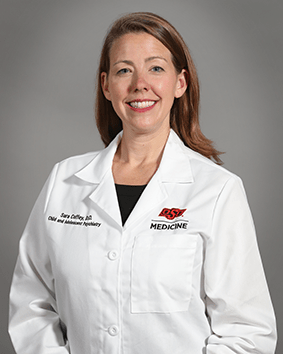
When should I get concerned about my child’s behavior?
Parents today have a myriad of factors to consider when raising a child, one of which is wondering if certain behaviors are “normal.” Dr. Sara Coffey, board-certified child and adolescent psychiatrist with OSU Medicine, answers some of these questions.
Q: Parents often wonder: Is my child’s behavior “normal?” How do we separate psychiatric illness and the behaviors that are associated with them?
That’s an important question that parents are bringing to my office, recognizing that kids are human, just like we’re humans, too. And sometimes they struggle with aggression, fear or anxiety. It’s really important for us to not go into making all of those behaviors an illness. We know that whenever we get frustrated, we might unintentionally yell or get dysregulated, or toddlers might use their teeth to bite something when they get really frustrated. That doesn’t mean that they have a psychiatric illness.
Q: What kind of behaviors should parents look for? What’s normal?
One of the questions that I often ask after that is tell me how old your child is. If you tell me your child is biting, and they’re 17, that’s going to be a lot different than if they’re two. We also know that kids are a moving target, and they’re always developing. What might be normal for a seven year old might not be normal for a 16 or 17 year old. It’s really important for us to have the lens of development when we’re asking about what is normal for children, because we have toddlers, preschoolers, school aged kids and adolescents. And there’s a range of what is considered normal, depending on the age of the child.
Q: What would be some concerning behaviors that you would caution parents to look out for?
I think anytime there’s a concern for the safety of the child, or somebody else, that’s when I get concerned as a child psychiatrist. So we might call this self-harming behavior, those kinds of issues, if the youth is harming themselves or harming others, that probably should be brought to the attention of the pediatrician or mental health professional. If there is an emergent concern for safety, families should call COPES, 988 or go to the nearest emergency room for an assessment. If it’s really interfering with the child’s life, the behaviors are preventing them from being able to go to school, the behaviors are preventing them from being able to have friends, that’s when I probably would seek out additional guidance.
Q: Do those issues typically show up in early childhood before they get to school? Is there a point where traditionally parents should seek to get an individualized education plan (IEP) or similar?
We know that early intervention is key. And so if we’re identifying that a kid is struggling in spite of all of our efforts and accommodations, it is important to go and talk to your pediatrician, perhaps seek mental health support, to make sure the child has the coping skills or we’re not missing something else that might be contributing.
This is why it’s really important to make sure that you’re going to your well child check ups, that pediatricians are screening for hearing, making sure that developmentally kids are doing okay. You can imagine a parent coming to you and saying, “My kid never listens to me.” And then turns out, they didn’t have a hearing test and there’s something that we need to address there. So it’s very important to make sure that you’re having those appointments with your pediatrician, and that you’re letting them know if you have concerns early on that, if they’re not doing everything else that Johnny’s doing or that Sally’s doing or you know, the preschool is really concerned that they’re doing a, b, and c behavior, those are good opportunities to talk with your doctor about what you’re concerned about.
Q: Is there a condition or a behavior that is most common?
What often presents most commonly to psychiatry are issues around anxiety. And for adults, we often think about this kind of generalized worry. But for kids, anxiety can look a lot different. These are kids that are kind of like that pent up soda can and then all of a sudden, they explode. They might have a lot of what we call midline somatic or physical symptoms. They don’t want to go to school because they have a headache or they have a tummy ache, and they’re going to the pediatrician, and there’s no underlying medical concern. Anxiety is a big one that we really want to look for with our kids across the age range from three year olds to 17 year olds. We don’t want to miss that because it’s quite easily treated. And oftentimes, unfortunately, as parents, we might further exacerbate the anxiety because we want to remove the discomfort from our kids. So we keep them home, we want to make sure they’re okay. And that can actually make things worse sometimes.
If you believe your child could benefit from an appointment with a psychologist or psychiatrist, reach out to OSU Behavioral Medicine. Your pediatrician and/or school counselor are also excellent resources.